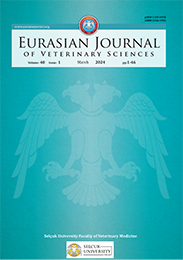| 2015, Cilt 31, Sayı 1, Sayfa(lar) 008-015 |
| [ Türkçe Özet ] [ PDF ] [ Benzer Makaleler ] |
| The effects of dietary supplementation of false flax (Camelina sativa L.) meal on performance, egg quality traits, and lipid peroxidation in laying quails |
| Tuba Bulbul1, Elmas Ulutas2 |
| 1Department of Animal Nutrition and Nutritional Diseases 2Department of Physiology, Faculty of Veterinary Medicine, University of Afyon Kocatepe, Afyonkarahisar, Turkey |
| Keywords: False flax meal, performance, egg quality, lipid peroxidation, laying quail |
| Downloaded:1731 - Viewed: 2555 |
|
Aim: This study was carried out to determine the effects of false flax
(Camelina sativa L.) meal supplementation to laying quail diets on
performance, egg quality traits, and lipid peroxidation in serum and
eggs.
Materials and Methods: A total of 240 (160 females and 80 males) eight-week-old Japanese quails (Coturnix coturnix japonica) divided into one control group and four treatment groups containing 48 quails. Each group was divided into four replicate groups each containing 12 quails. The control group was fed diet containing soybean meal basis without false flax meal (0% FFM). The FFM was used at level of 5% (FFM5), 10% (FFM10), 15% (FFM15), and 20% (FFM20) in treatment diets. The experimental period was lasted for 8 weeks. Results: The results showed that feed intake was lowest in the FFM15 and FFM20 groups (P<0.01). Final body weight (P<0.05) and egg production (P<0.01) decreased in the FFM15 and FFM20 groups compared with the control group. Egg yolk color index increased in the FFM20 group in the 4th week (P<0.001) and in all experimental groups in the 8th week (P<0.01). Dietary FFM supplementation did not affect initial body weight, egg weight, feed efficiency, egg shape index, egg shell thickness, egg albumen index, egg yolk index or Haugh unit. The serum malondialdehyde level decreased (P<0.05) in the FFM10, FFM15, and FFM20 groups, while the serum antioxidant activity level increased (P<0.01) in all experimental groups compared with the control group. The egg yolk malondialdehyde level decreased in all experimental groups compared with the control group on the 1st (P<0.05) and 15th (P<0.001) days of storage. Conclusion: It may be stated that supplementation of up to 10% of FFM to diets prevents lipid peroxidation without adversely affect on the performance in laying quails. |
| [ Türkçe Özet ] [ PDF ] [ Benzer Makaleler ] |




